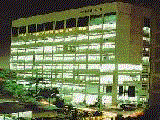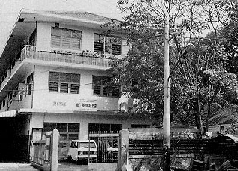 By Damar Harsanto, The Jakarta Post
By Damar Harsanto, The Jakarta PostForty-five years since its last renovation, the area around Senen market, with its heavy traffic, street vendors and thugs, is scheduled to undergo a complete makeover into a modern, integrated commercial center.
City market operator PD Pasar Jaya will begin the Rp 3 trillion project early next year.
"The raising of the concrete piles will mark the beginning of a three-year renovation of the old market, one of three oldest and largest traditional markets in the capital," PD Pasar Jaya president director Prabowo Soenirman said.
Senen market, known as Vincke Passer during the Dutch colonial era, was built in 1735 by Justinus Cornellis Vincke, who also developed Tanah Abang market in Central Jakarta.
This will be the second refurbishment for the market in the modern era, with the first renovation ordered by the country's founding president Sukarno in 1961.
"We are now in the process of finalizing the urban design guidelines for the project," Prabowo said.
The project will revitalize the market that in the past was a center of trade in the capital, he said.
However, critics have accused the administration of failing to invite the public to play a greater role in the planning and implementation of the project.
The administration has insisted on using its own design for the refurbished Senen, even though an architectural design competition organized by the Central Jakarta municipality last year came up with a winning design. That design, titled "Life in Tomorrow's Senen", was the work of a team of architects led by Maryanti Kusuma Asmara.
Prabowo said the design from Maryanti and team was not being used for two reasons: the shareholders in Senen market were not involved in the competition and the winning design was not "business friendly".
PD Pasar Jaya is the majority owner and operator of Senen market, while six blocks in the market are owned by city developers Pembangunan Jaya and Jaya Realty.
The three companies have formed a joint venture company, PT Jaya City Development, to operate the refurbished Senen market.
Pasar Jaya holds a 35 percent share of the new company, while Pembangunan Jaya has a 35 percent share and Jaya Realty a 30 percent share.
Governor Sutiyoso said on Monday the new Senen market would be integrated with other facilities, including 30-story apartment towers with about 2,500 total units, office buildings, sports facilities, a bus terminal and a railway station.
The operations director at PD Pasar Jaya, Joko Setiyanto, said the modern market would provide space for over 10,000 kiosks for Senen market traders, who over the years have made Senen the place to find a vast range of products, from jewelry, watches and pharmaceuticals, to traditional foods, spices and cookies.
"We want this market to become a 24-hour trade center," he said.
During the first stage of renovation work on blocks one to three, traders will be moved temporarily to the second floors of blocks four, five and six.
"After we complete the first stage of renovation, then we will go ahead and renovate blocks four to six," Prabowo said.
In addition to the revitalization of the area around Senen market, the administration has floated ideas for reviving other large traditional markets like Tanah Abang and Jatinegara in East Jakarta.
Time line of Senen area:
- 1730 Vincke builds a market near Weltevreden palace (now Gatot Subroto Army Hospital), near the Tanah Abang market. The new market is called Vincke Passer. But because the market is only open on Mondays, people begin calling it Senen, which means Monday.
- 1735 Vincke orders the construction of Jl. Prapatan, linking the Senen and Tanah Abang markets.
- 1960-1970 Jakarta governor Ali Sadikin orders the renovation of the area around Senen market, which now includes a parking area, bus terminal and the Senen sports complex.
- Jan. 15, 1974 The market is burned during violent student demonstrations in the capital against a visit by Japanese prime minister Tanaka.
- 1987-1992 Jakarta governor Wiyogo Atmodarminto orders the development of a modern block for the market, known as Atrium Senen.
- Nov. 23, 1996 A large fire destroys 750 shops and stalls in the market.
- Jan. 26, 2003 A fire destroys more than 100 kiosks in the market.

